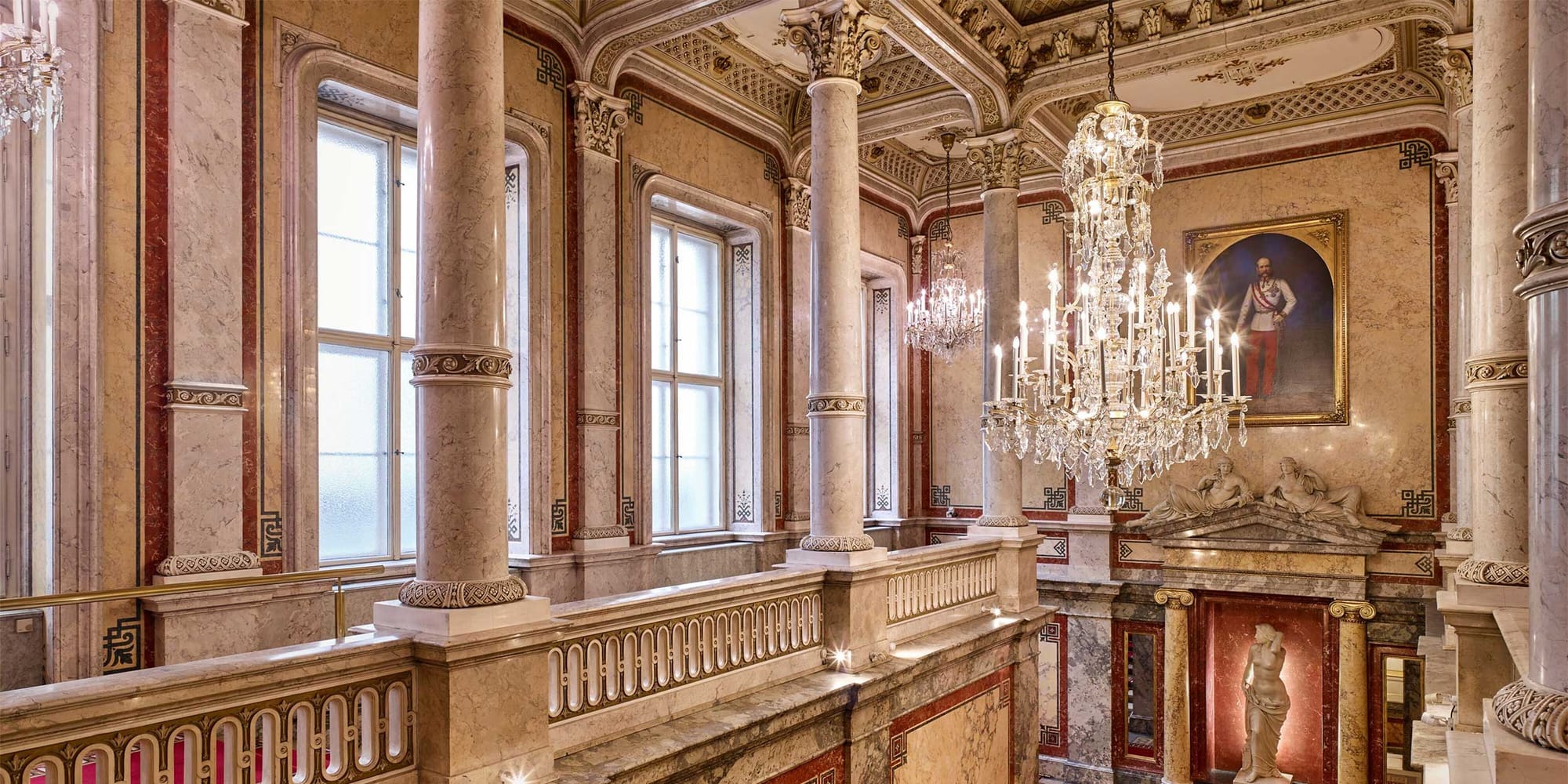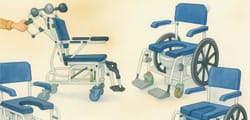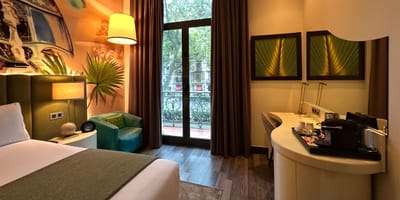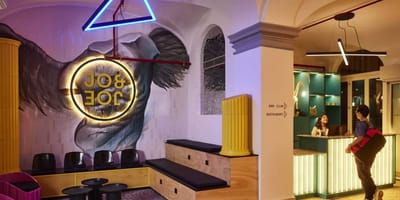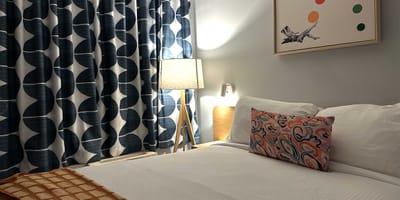Located on Vienna’s iconic Ringstrasse and mere steps from Karlsplatz and the Vienna State Opera, the Hotel Imperial, a Luxury Collection Hotel is a palatial reminder of Austria’s imperial past. Originally built as a royal residence in 1863, the property now operates under Marriott’s Luxury Collection brand, delivering stays that can feel every bit as regal as its name suggests.
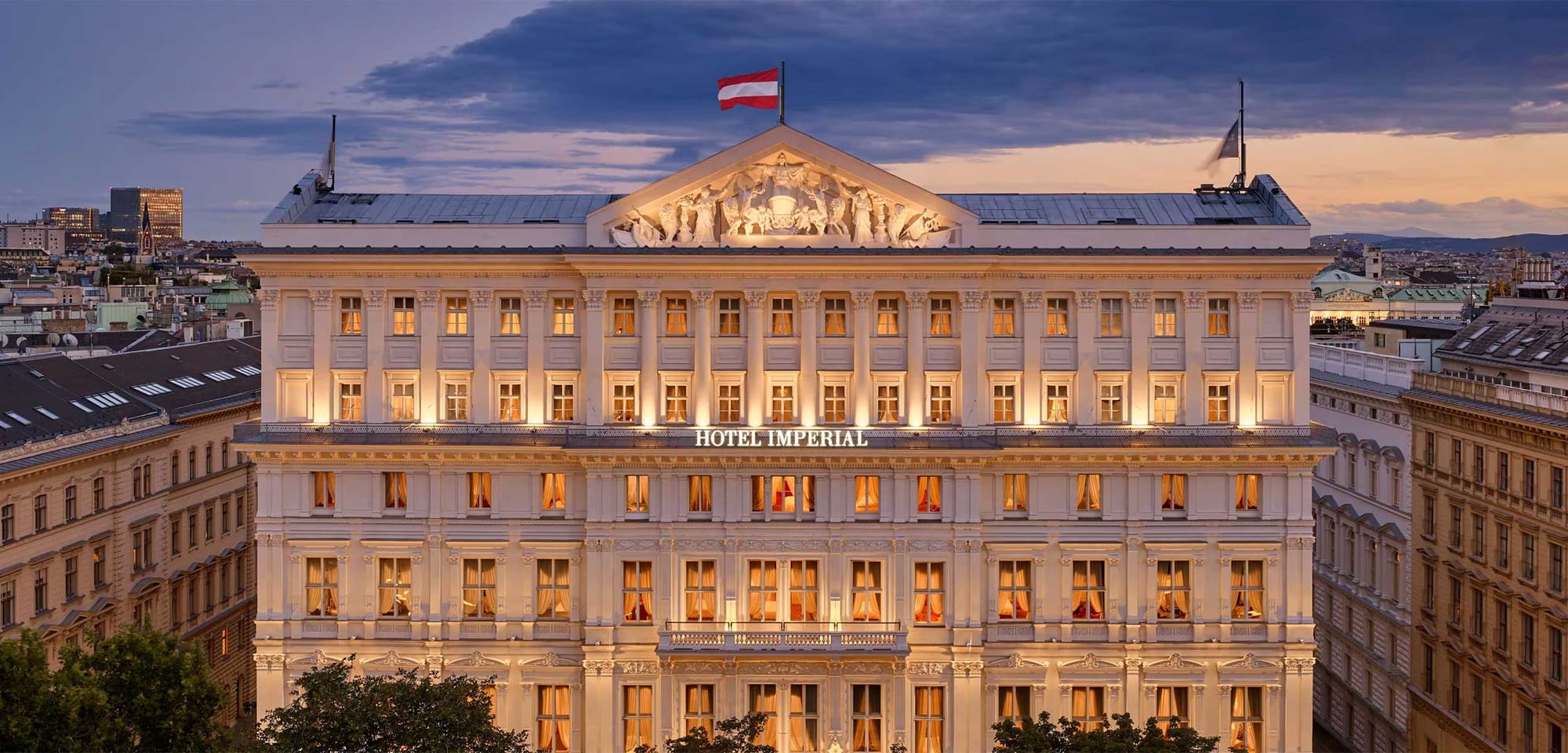
The Luxury Collection brand competes with top-tier offerings like St. Regis and Waldorf Astoria, and the Hotel Imperial certainly earns its place among them. During my one-night stay, the staff at this landmark hotel offered impeccable service and I was surrounded by stunning architecture in an elegant atmosphere. While the wheelchair accessible guest room left a few things to be desired, it was workable.
Room Rates and Reservations
As expected for a five-star hotel in the heart of Vienna, room rates at the Hotel Imperial are expensive, with standard rooms typically ranging from €500 to €1,000 Euros per night. There are some lower prices to be found, with a handful of nights priced under €400 per night.
Luxury properties like this are only accessible to me through rewards points, so I was grateful to secure a booking using Marriott Bonvoy points instead of cash. Looking at the award calendar over the next year, rooms can be booked for between 57,000 and 101,000 points per night — it's a steep points price, but redeeming points will save you a considerable amount of money.
Reservations for accessible rooms can be made directly through the Hotel Imperial website. After booking, I confirmed my accessibility needs with the hotel directly.
Wheelchair Accessible Room at Hotel Imperial Vienna
My Deluxe Guest Room with a king-size bed and roll-in shower was located on the fourth floor (room number 409) and reflected the hotel’s blend of imperial charm. High ceilings, crystal chandeliers, and elegant antique furnishings transported me to another era, while wide doorways, smooth flooring and key accessibility features made my stay possible.
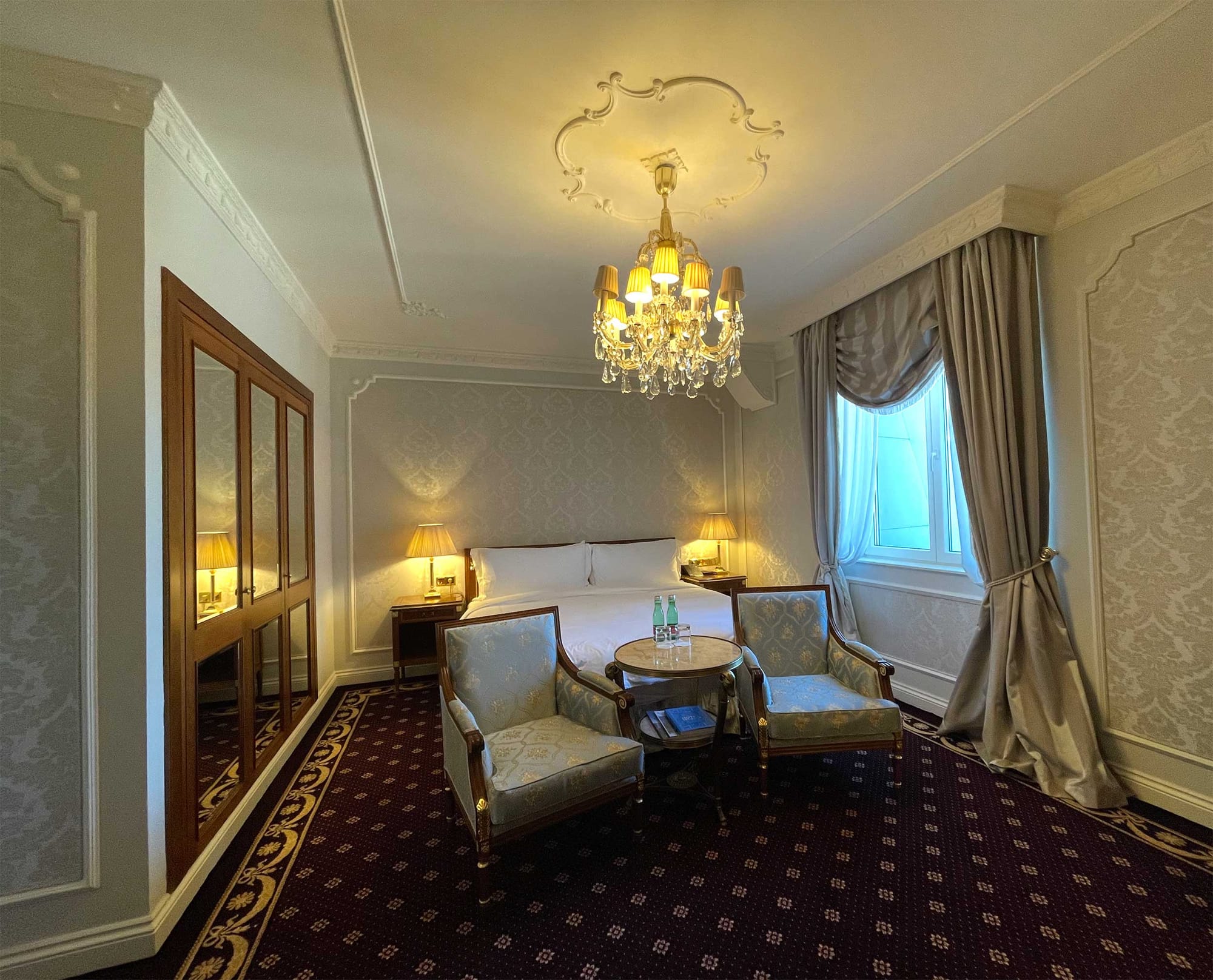
The bed was accessible on both sides and exceptionally comfortable, with crisp linens and soft pillows that ensured a great night’s sleep. The wooden headboard featured adjustable reading lights. I truly felt like a king sleeping on this luxurious king size bed in such a beautifully appointed hotel room (forgive me, but it's true).
The carpet in the bedroom was ornate and stunning, but thick. It proved no match for my power wheelchair, but it would likely frustrate manual wheelchair users.
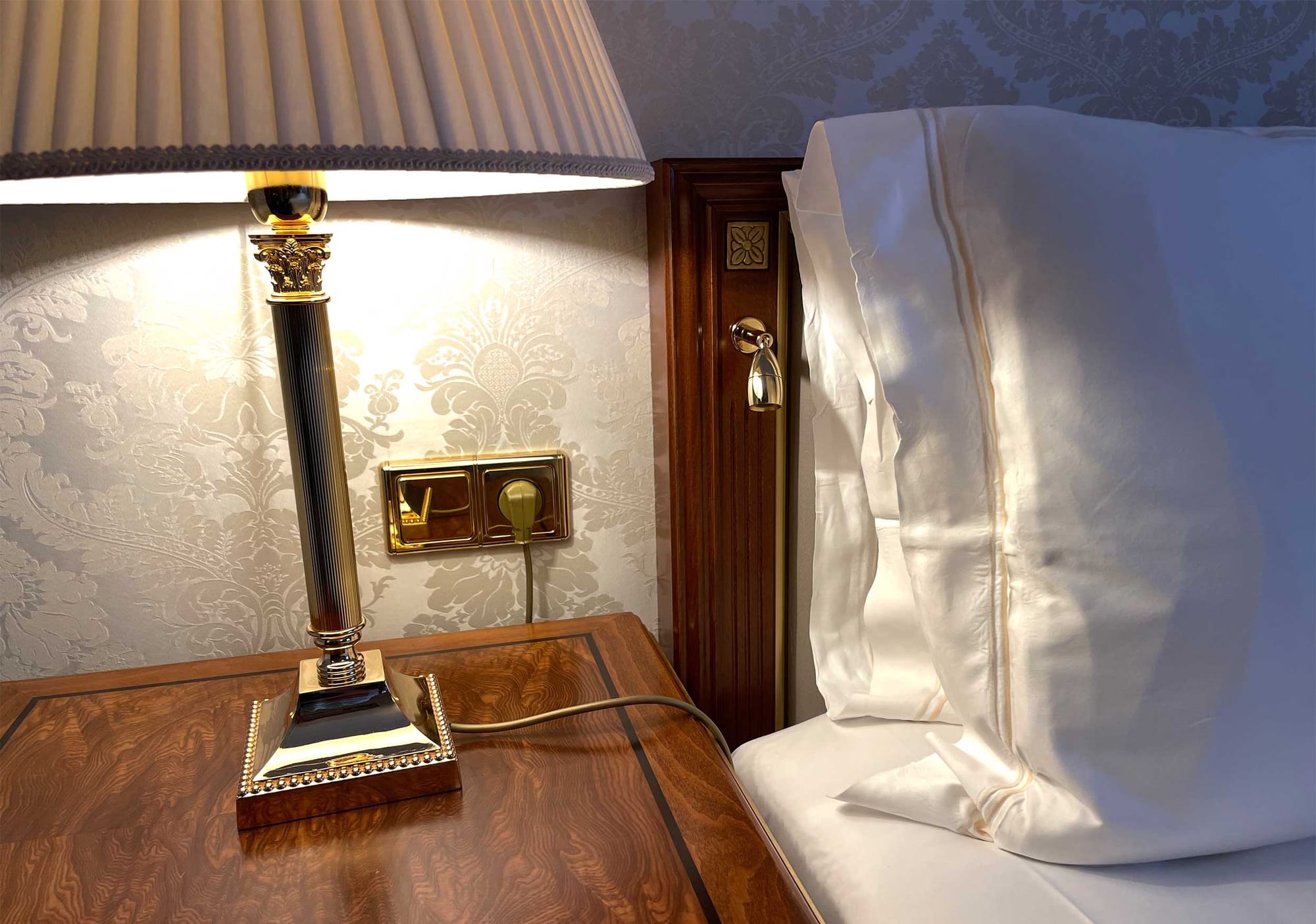
One power outlets was located at each side of the bed. They were easy to reach from a seated position, but I did have to unplug the lamps to free them up.
Note that electricity in Austria is delivered at 230 volts. Travelers from the U.S. and North America may need to use a step-down power transformer to charge wheelchairs that use the 120V standard. Please see the guide to charging a power wheelchair abroad for more information and tips. My wheelchair has a dual-voltage charger, so I plugged right into the wall (with a universal plug adapter) and charged without issue.
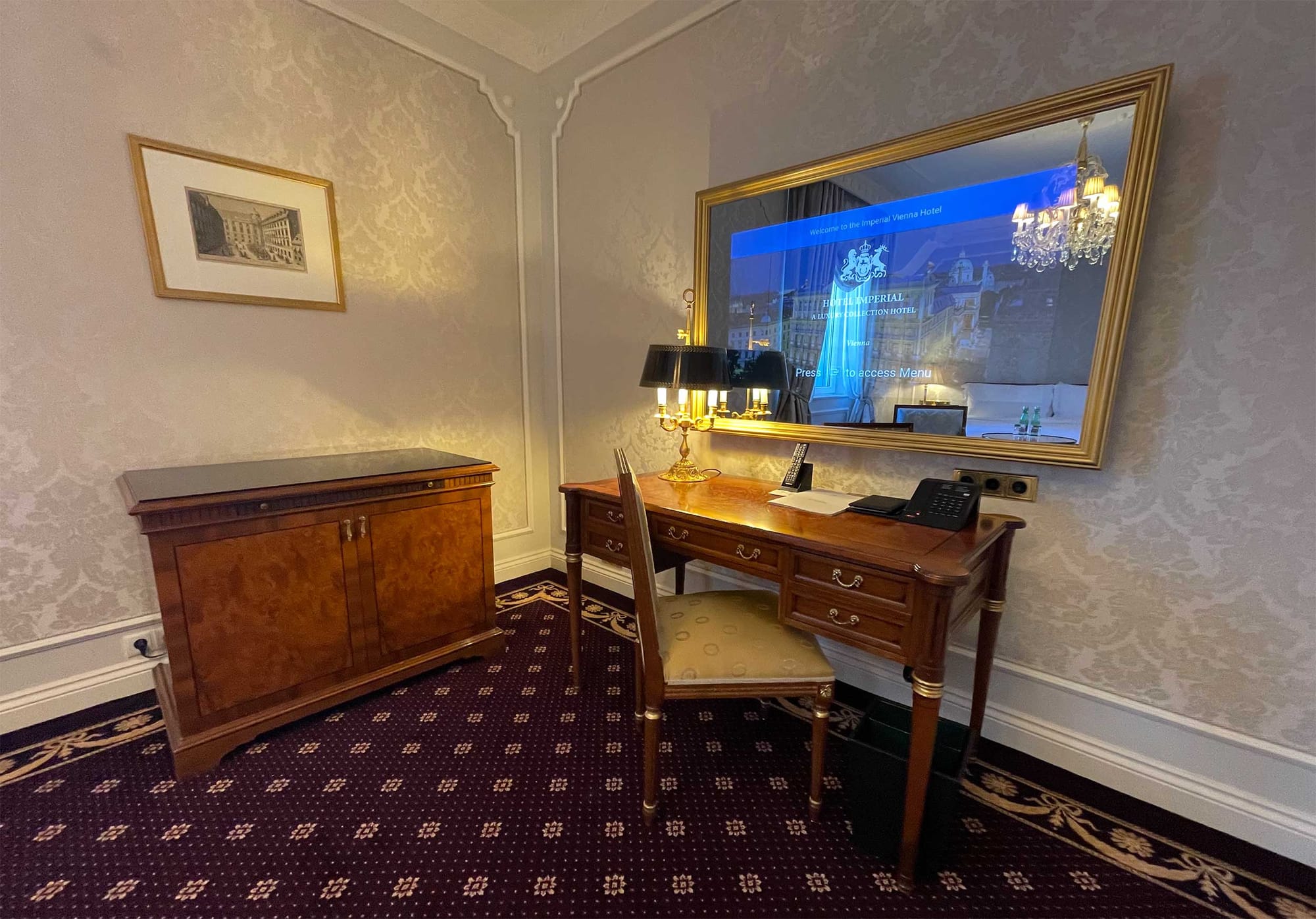
The desk in the room was lovely, and I was able to roll underneath (just barely) while seated in my power wheelchair. A large television, placed behind a mirror, was located above the desk.
Wheelchair Accessible Bathroom with Roll-in Shower
The marble bathroom, its centerpiece a golden mirror, was beautiful but not as accessible as I would have liked. Thoughtful updates could be made to improve accessibility and, to be honest, one should expect the highest level of access at a luxury hotel.
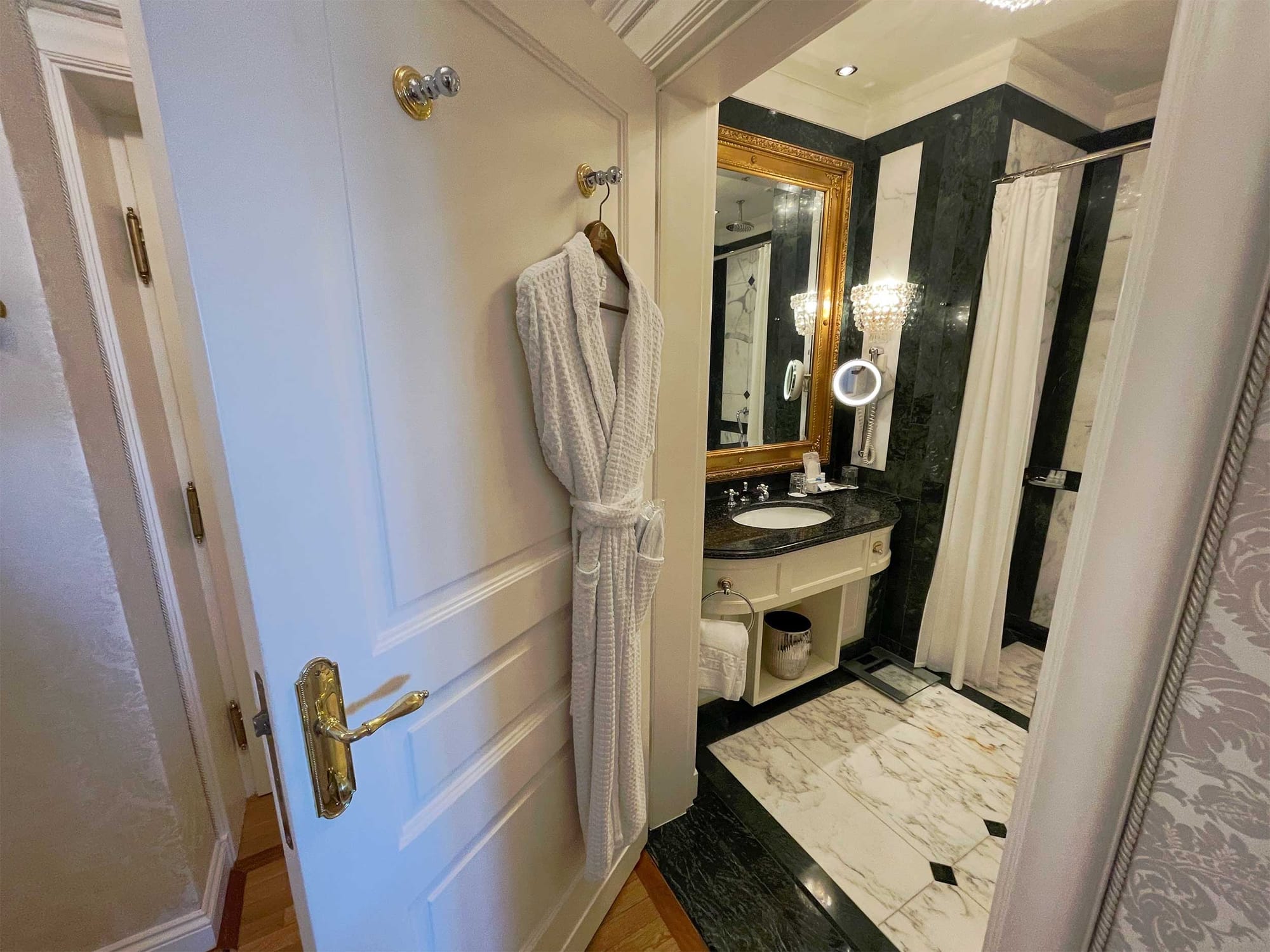
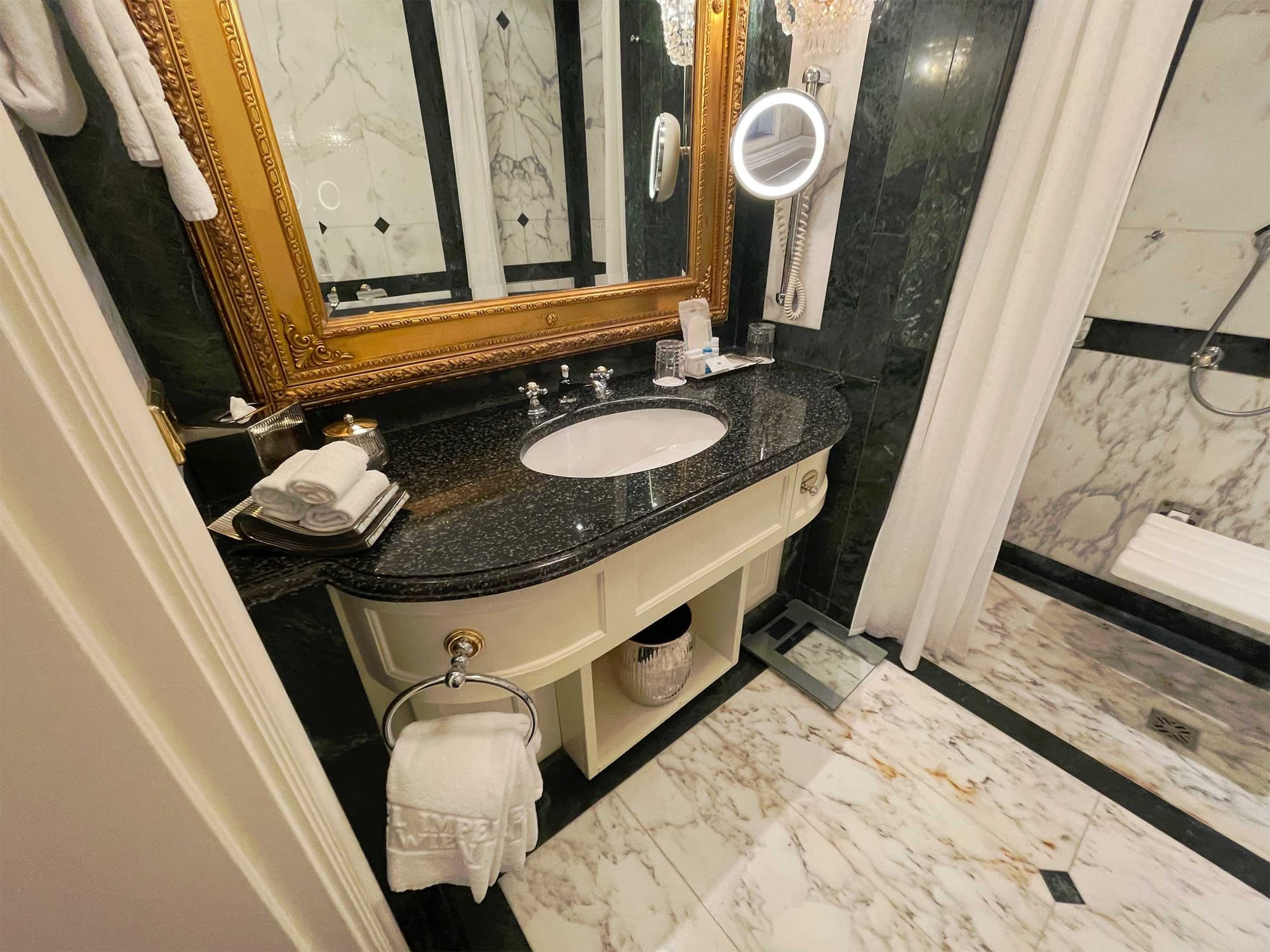
Pictured above is the fairly level meeting point of the hotel room's wood-floored entry foyer and the marble tile-floored bathroom. The first thing you'll likely notice is a sink that is not roll-under, which was a significant disappointment. While I could park sideways in front of it, that made it tough to shave and brush my teeth without getting wet.
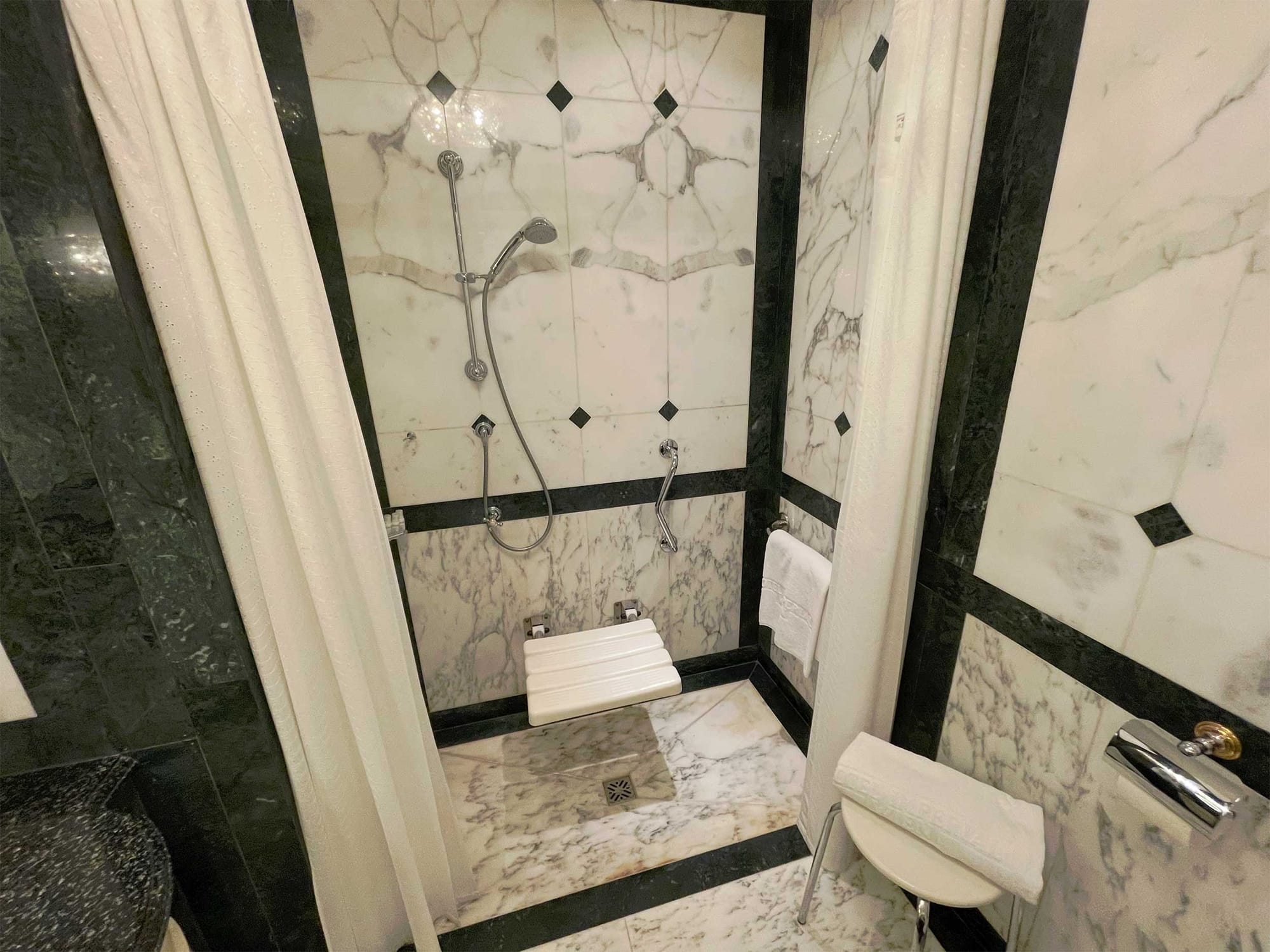
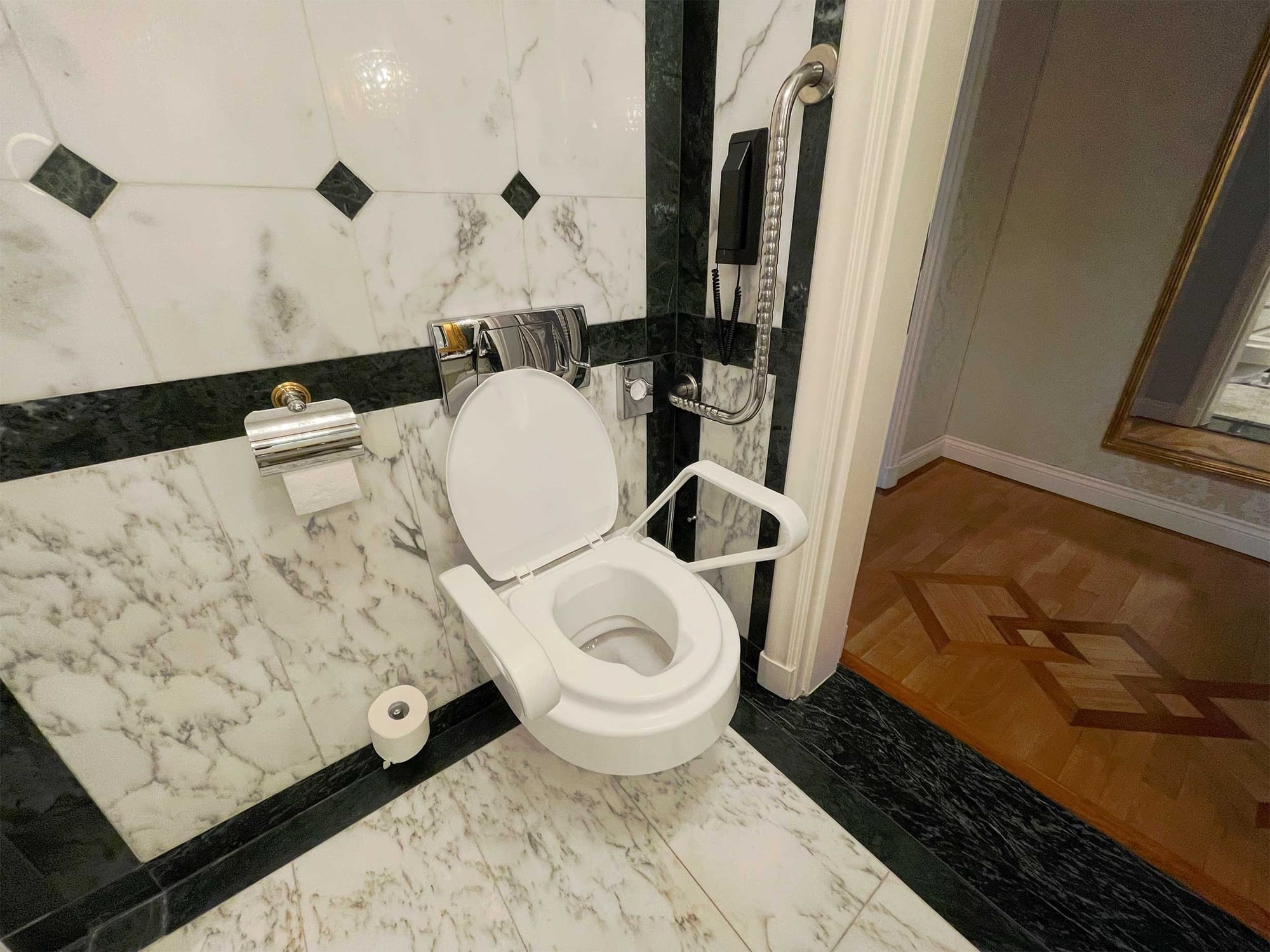
The roll-in shower was relatively small, but it was equipped with a sturdy wall-mounted seat. The problem was that it was mounted on the back wall and quite a distance from the nearest horizontal grab bar. There was a stool in the bathroom, which I used instead — that was easier to position where I wanted and in a safer location.
The toilet was outfitted with a seat that had two armrests — regrettably, they could not be raised without raising the entire toilet seat. The adjacent wall-mounted grab bar was small, and not very useful to me. Though I made the toilet seat work with some difficulty, I would have requested the seat be swapped for a standard toilet seat had I been staying more than one night.
It was clear to me that the accessible bathroom had been designed with only one type of traveler in mind — a semi-ambulatory person. Embracing the ADA Standards for Accessible Design from the United States, or a more expansive universal design criteria would expand the bathroom's utility to a wider range of disabled guests.
Dining at Hotel Imperial
Dining at the Hotel Imperial is a special occasion in itself. The Opus Restaurant serves elevated Austrian cuisine in a richly appointed dining room, while Café Imperial Wien offers coffee, pastries and the famous Imperial Torte in a setting frequented by members of high society.
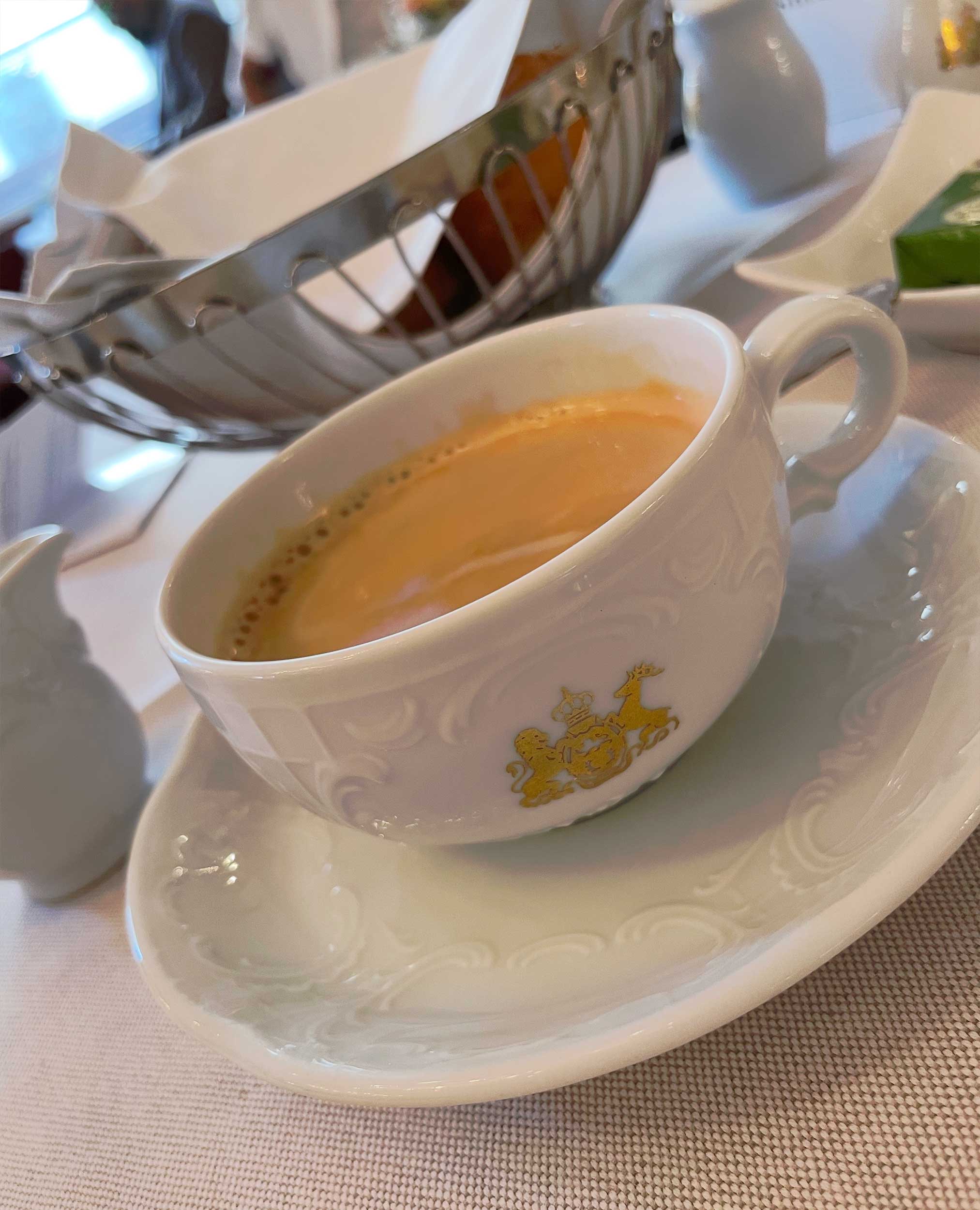
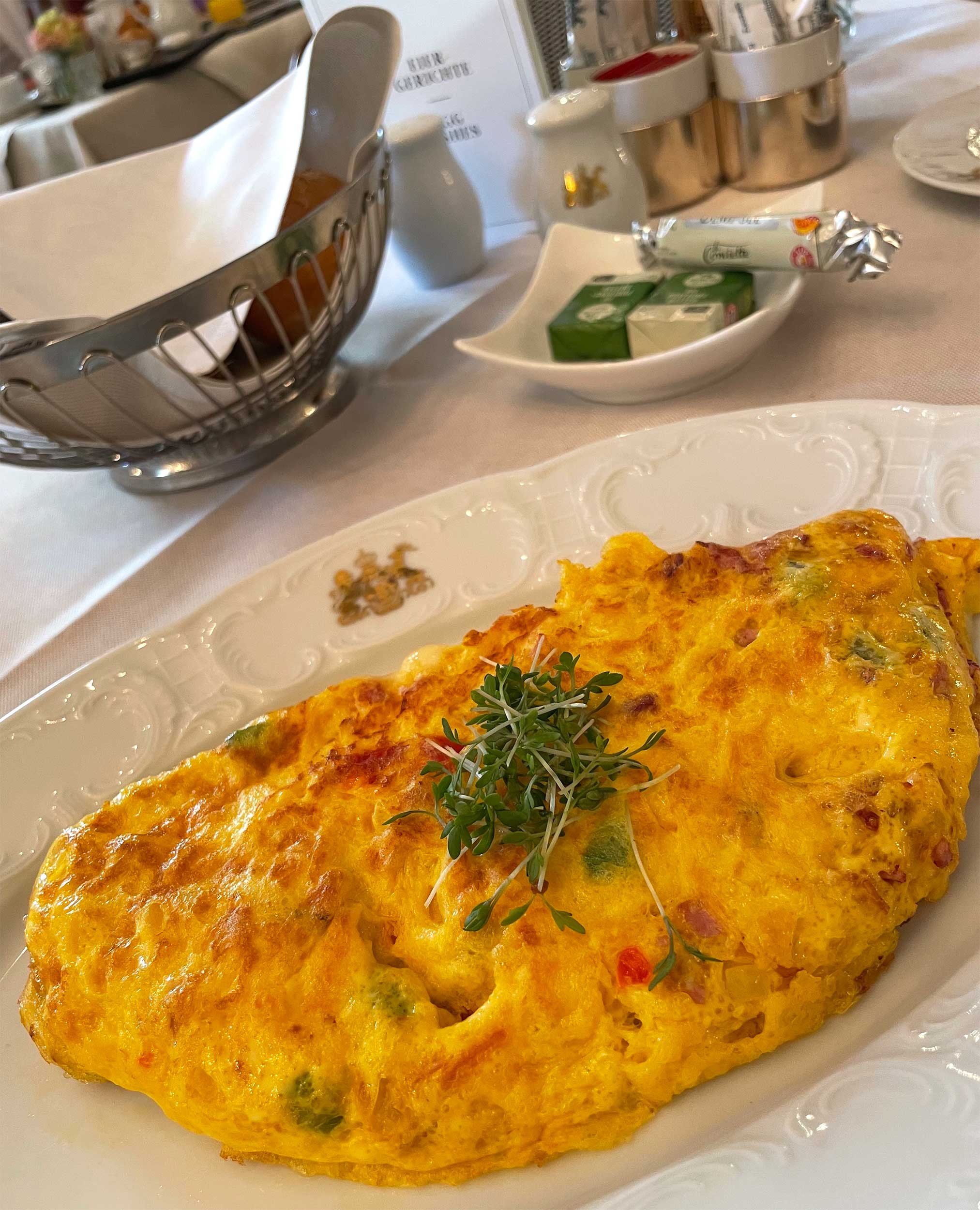
I enjoyed one meal at the hotel, breakfast in the café — a double espresso and a delicious omelette. At Luxury Collection hotels, I am entitled to complimentary breakfast thanks to my Marriott Bonvoy elite status.
Location & Accessibility
The Hotel Imperial is ideally located on the Ringstrasse, within rolling distance of many major attractions:
- Musikverein (Vienna Philharmonic Orchestra) – 0.1 miles
- Vienna State Opera — 0.2 miles
- Vienna Museum — 0.2 miles
- St. Charles's Church — 0.25 miles
- Kunsthistorisches Museum — 0.7 miles
- Stephansplatz and St. Stephen's Cathedral – 0.7 miles
- Belvedere Palace — 0.9 miles
Public transportation in Vienna is impressively accessible, and the nearby Karlsplatz station connects to multiple metro lines with elevators and level boarding.
Final Thoughts
The Hotel Imperial, Vienna is a masterpiece of old-world elegance blended seamlessly with timeless luxury. While the hotel does have rooms with some adaptations for disabled travelers, those rooms do not have the accessibility features modern travelers have come to expect. For rooms that are sometimes sold for more than a thousand Euros per night, greater investment should be made to ensure that disabled guests can enjoy the splendor that makes this hotel a cultural icon without sacrificing accessibility.
If this hotel's level of accessibility works for you, I am sure you will enjoy a memorable five-star stay — if not, there are far more accessible hotels at a significantly lower price all across Vienna.
Featured image courtesy Marriott International.

